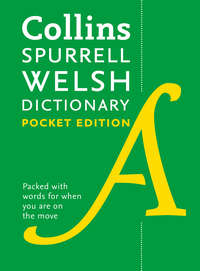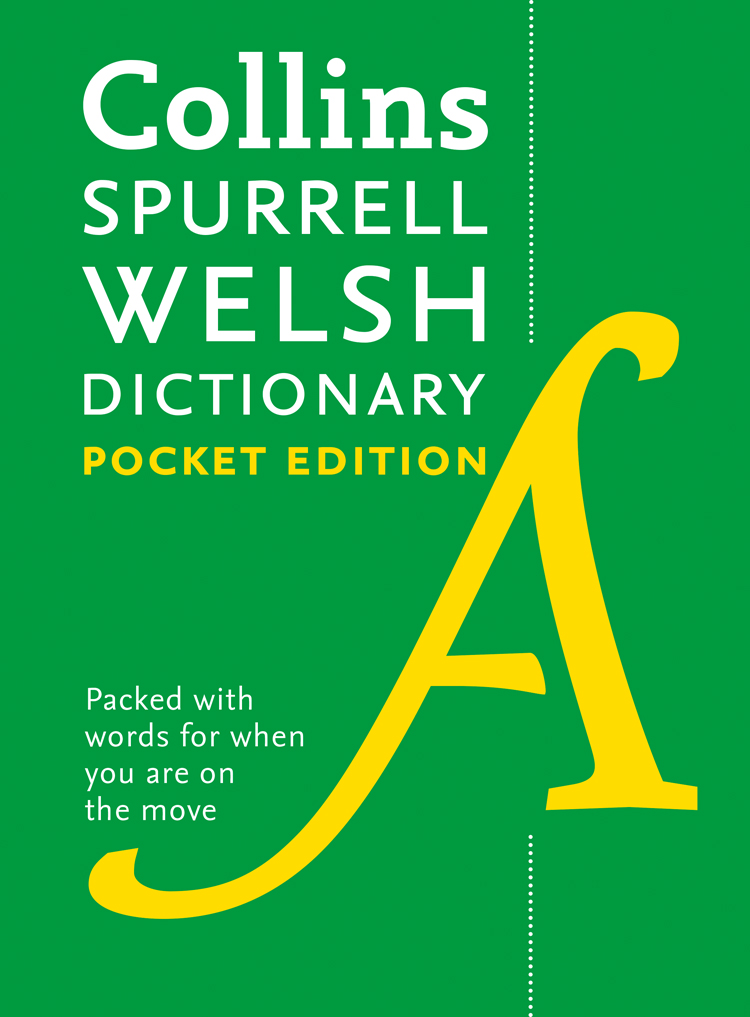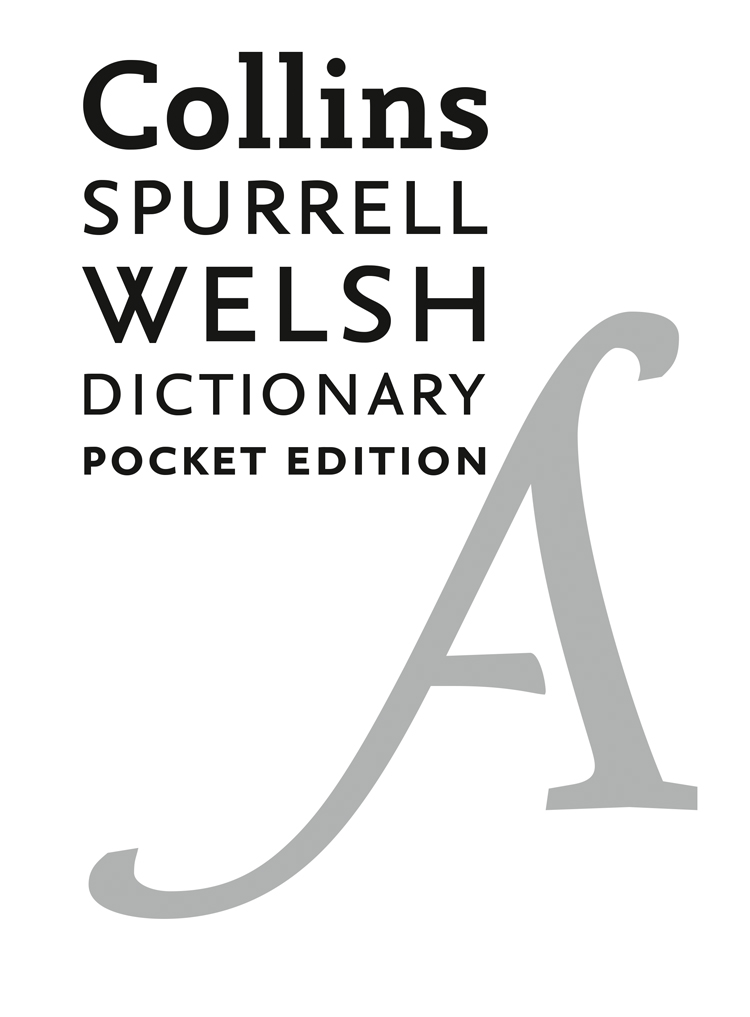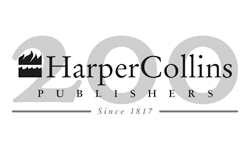
Collins Spurrell Welsh Dictionary Pocket Edition: trusted support for learning



COPYRIGHT
Published by Collins
An imprint of HarperCollins Publishers
Westerhill Road
Bishopbriggs
Glasgow G64 2QT
Fourth Edition 2017
© HarperCollins Publishers 1992, 2006, 2009, 2017
Collins® is a registered trademark of HarperCollins Publishers Limited
www.collinsdictionary.com
Typeset by Sharon McTeir
All rights reserved under International and Pan-American Copyright Conventions. By payment of the required fees, you have been granted the non-exclusive, non-transferable right to access and read the text of this e-book on screen. No part of this text may be reproduced, transmitted, downloaded, decompiled, reverse engineered, or stored in or introduced into any information storage and retrieval system, in any form or by any means, whether electronic or mechanical, now known or hereinafter invented, without the express written permission of HarperCollins.
Entered words that we have reason to believe constitute trademarks have been designated as such. However, neither the presence nor absence of such designation should be regarded as affecting the legal status of any trademark.
The contents of this publication are believed correct at the time of creation. Nevertheless, the Publisher can accept no responsibility for errors or omissions, changes in the detail given or for any expense or loss thereby caused.
HarperCollins does not warrant that any website mentioned in this title will be provided uninterrupted, that any website will be error-free, that defects will be corrected, or that the website or the server that makes it available are free of viruses or bugs. For full terms and conditions please refer to the site terms provided on the website.
If you would like to comment on any aspect of this book, please contact us at the given address or online.
E-mail:
dictionaries@harpercollins.co.uk


Acknowledgements
We would like to thank those authors and publishers who kindly gave permission for copyright material to be used in the Collins Corpus. We would also like to thank Times Newspapers Ltd for providing valuable data.

E-book Edition © July 2017
ISBN 9780008204297
Version: 2017-06-16
CONTENTS
Cover
Title Page
Copyright
Introduction
Notes on the pronunciation of Welsh
Mutations
Abbreviations
WELSH-ENGLISH
Welsh Grammar
ENGLISH-WELSH
About the Publisher
INTRODUCTION
The first Spurrell Welsh-English dictionary appeared in 1848 published by William Spurrell (1813–89) the Carmarthen printer and publisher. One of his sons, Walter Spurrell (1858–1934), joined his father in the business and the family firm published a series of distinguished Welsh-English, English-Welsh dictionaries and influential Welsh grammars during the latter part of the nineteenth century and the first half of the last century. William Spurrell was advised by and well-acquainted with Daniel Silvan Evans (1818–1903), one of the father figures of Welsh lexicography, sometime lecturer in Welsh at St David’s University College, Lampeter and the first professor of Welsh to be appointed by the University of Wales.
The Collins-Spurrell Welsh Dictionary was first published in 1960 and quickly became an essential tool of general reference for Welsh learners as well as those anxious to interpret literature. It was edited by Henry Lewis, Professor of Welsh Language and Literature at University College, Swansea, with valuable contributions from the staff of the Department of Welsh Language and Literature at St David’s University College, Lampeter.
D A THORNE
NOTES ON THE PRONUNCIATION OF WELSH
VOWELS
They are sounded, long or short, as the vowels in the English words given below.
A palm, pat. E gate (without diphthongization), get. I feet, fit. O more, not. U (1) North Wales: like French u or German ü without rounding lips. (2) South Wales: as I. W cool, full. Y (1) In monosyllables generally, and in final syllables, as U (the ‘clear’ sound). (2) In all but final syllables, and in y, yr (the), fy (my), dy (thy), yn, yng, ym (in), the adverbial yn, the preverbal and relative particle y, yr (y’m, y’th etc), syr (sir), nyrs (nurse), as English fun, (the ‘obscure’ sound).DIPHTHONGS
1 Falling diphthongs, in which the second sound is consonantal: the two vowels have the sound noted above: ae, oe, ai, oi, the diphthong ei as English by, aw, ew, iw, ow, uw, ŵy, yw. 2 Rising diphthongs, in which the first sound is consonantal: ia, ie, io, iw, iy, (‘obscure’ y); wa, we, wi, wo, wy, (‘clear’ y), wy, (‘obscure’ y).CONSONANTS
Only those which differ from English need to be noted.
CH (following C in the alphabet), as Scottish loch. DD (following D in the alphabet), as th in English this, breathe. F as English v. FF as English f. G always as in English go. NG (following G in the alphabet), as in English sing. In some words (e.g. dangos), however, it is sounded ng-g, as in English longer. Alphabetically this follows after N. LL produced by placing the tongue to pronounce l, then emitting breath without voice. PH (following P in the alphabet), as English f. TH always as th in English thin.ACCENT
Welsh words are generally accented on the last syllable but one. There are certain exceptions:
1 The reduplicated personal pronouns myfi, tydi, efe, efô, hyhi, nyni, chwychwi, hwynt-hwy, accented on the final syllable. 2 Verbs in -(h)au, -(h)oi, -eu, accented on the final syllable. 3 A few dissyllabic words beginning y + consonant, accented on the final syllable. 4 Certain polysyllabic words with a diphthong resulting in contraction in the final syllable, such as Cymraeg. 5 Some borrowed words accented as in the language of origin, generally English.MUTATIONS
Mutations, or letter changes, can occur at the beginning of Welsh words. Mutations are caused by the preceding word. There are three different mutations:
Llythyren wreiddiol Treiglad meddal Treiglad trwynol Treiglad llaes Original letter Soft mutation Nasal mutation Aspirate mutation changes to: changes to: changes to: P b mh ph t d nh th c g ngh ch b f m d dd n g - ng ll l m f rh rCOMMON WORDS CAUSING SOFT MUTATION – TREIGLAD MEDDAL
ei his dy your dau / dwy two (masculine / feminine) pa which neu or rhy too yn before an adjective Adjectives which come before the noun: For example: Mae’r hen ddyn yn byw yn y tŷ. The old man lives in the house. Dyma fy hoff gân. This is my favourite song. Some prepositions: For example: Mae’r bws yn mynd i Gaerdydd. The bus is going to Cardiff. Maen nhw’n chwarae dros dîm yr ysgol. They play for the school team. Certain words which come before a feminine noun: y and ’r the un one Mae castell yn y dref. There’s a castle in town. Mae’r ddinas wedi gwella. The city has improved. Dim ond un broblem sydd ar ôl. There’s only one problem left. Any feminine noun which has an adjective immediately after it: merch dda a good girlCOMMON WORDS CAUSING NASAL MUTATION – TREIGLAD TRWYNOL
fy my yn inCOMMON WORDS CAUSING ASPIRATE MUTATION – TREIGLAD LLAES
a and â as/to/with chwe six ei her gyda with tri three tua approximatelyWELSH–ENGLISH
A
B
C
CH
D
E
F
FF
G
H
I
J
L
LL
M
N
O
P
R
RH
S
T
TH
U
W
Y
a
a1 interrogative particle, preverbal particle, rel pron who, that, which
a2, ac conj and
a3 excl ah, oh
â1, ag conj as
â2, ag prep with
ab, ap nm son (before name, in place of surname, like ‘Mac’)
abad (-au) nm abbot
abadaeth (-au) nf abbacy, abbotship
abades (-au) nf abbess
abatir (-oedd) nm abbey-land
abaty (abatai) nm abbey
aber (-oedd, ebyr) nm confluence; mouth of river, estuary; brook, stream
aberfa (-oedd) nf mouth of river, estuary
abergofiant nm forgetfulness, oblivion
aberth (-au, ebyrth) nm sacrifice
aberthged nf oblation; offering of fruits
aberthol adj sacrificial
aberthu vb to sacrifice
aberthwr (-wyr) nm sacrificer
aberu vb to flow into
abid nmf apparel; dress of religious order
abiéc nmf alphabet
abl adj able; well-off
abladol adj ablative
abledd nm ability; plenty
abrwysg adj clumsy, drunken
absen nm absence; slander
absennol adj absent
absennu vb to backbite, to slander
absennwr (absenwyr) nm backbiter
absenoldeb nm absence
absenoli vb to absent
absenoliaeth (-au) nf absenteeism
abwyd, abwydyn (abwydod) nm worm; fishing-bait
ac, a conj and
academaidd adj academic
academi (-ïau) nm academy
acen (-ion) nf accent
aceniad nm accentuation
acennod nm accent mark
acennu vb to accent, to stress
acenyddiaeth nf accentuation
acer (-i) nf acre
aciwbigiad (-au) nm acupuncture
acne nm acne
acrilig adj acrylic
act (-au) nf act
actio vb to act
actor (-ion) nm actor
actores (-au) nf actress
acw adv there, yonder
ach1 excl ugh
ach2 (-au, -oedd) nf degree of kinship; (pl) pedigree, ancestry
aches nm tide, flood; eloquence
achfre nmf see achwre
achlân adv wholly, entirely
achles (-oedd) nf succour, protection; manure
achlesol adj succouring
achlesu vb to succour, to cherish
achlod nm shame, disgrace
achlust nm rumour
achlysur (-on) nm occasion
achlysurol adj occasional
achos1 (-ion) nm cause, case
achos2 conj because, for
achosi vb to cause
achres (-i, -au) nf genealogical table
achub vb to seize, to snatch; to save, to rescue; achub y blaen to forestall; achub y cyfle to seize the opportunity
achubiaeth nf salvation
achubol adj saving
achubwr (-wyr), achubydd (-ion) nm saviour, rescuer
achul adj thin, emaciated
achwre, achfre nmf under-thatch, protection; covering, garment
achwyn vb to complain ▶ nm (-ion) complaint, plaint
achwyniad (-au) nm complaint, accusation
achwynwr (-wyr) nm complainer; complainant, plaintiff
achwynyddes (-au) nf complainant
achydd (-ion) nm genealogist
achyddiaeth nf genealogy
achyddol adj genealogical
achwyngar adj querulous
ad- prefix very; second; bad, re-
adail nf building, edifice, structure
adain, aden (adenydd) nf wing; fin; spoke
adamant nm adamant, diamond
adamantaidd adj adamantine
adar npl (nm aderyn) birds, fowls; adar drudwy, adar yr eira starlings; adar y to sparrows
adara vb to catch birds, to fowl
adardy (-dai) nm aviary
adareg nf ornithology
adargi (-gwn) nm retriever, setter, spaniel
adargraffiad (-au) nm reprint
adarwr (-wyr) nm fowler
adarwriaeth nf fowling
adarydd (-ion) nm ornithologist
adarydda n birdwatching ▶ vb to go birdwatching
adaryddiaeth nf ornithology
ad-dalu vb to repay, to requite
ad-drefnu vb to rearrange
adeg (-au) nf time, occasion, opportunity
adeilad (-au) nmf building, edifice
adeiladaeth nf building; edification, construction
adeiladol adj edifying, constructive
adeiladu vb to build, to edify
adeiladwaith nm construction
adeiladwr (-wyr), adeiladydd (-ion) nm builder
adeiledd nm structure
adeiniog adj winged
aden (-ydd, edyn) nf wing; see also adain
adenedigaeth nf regeneration
adeni vb to regenerate
adennill vb to regain, to recover
aderyn (adar) nm bird
adfach (-au) nm barb; liver-fluke
adfail (-feilion) nm ruin
adfeddiannu vb to repossess
adfeiliad nm decay, ruin
adfeiliedig adj decayed, in ruins
adfeilio vb to decay, to moulder
Adfent nm Advent
adfer, adferu, adferyd vb to restore
adferf (-au) nf adverb
adferfol adj adverbial
adferiad nm restoration
adferol adj restorative; remedial
adferwr (-wyr) nm restorer
adflas nm after-taste, bad taste
adfyd nm adversity
adfydus adj adverse, miserable
adfynach nm renegade monk
adfyw adj half alive, half dead
adfywhau vb to revive, to reanimate
adfywiad (-au) nm revival
adfywio vb to revive, to resuscitate
adfywiol adj refreshing
adiad nm drake
adio nm addition ▶ vb to add
adiolyn (adiolion) nm additive
adladd, adlodd nm aftermath
adlais (-leisiau) nm echo
adlam (-au) nm home; rebound; cic adlam drop-kick
adlamu vb to rebound
adleisio vb to resound
adlewyrch, adlewyrchiad (adlewyrchiadau) nm reflection
adlewyrchu vb to reflect
adlewyrchydd (-ion) nm reflector
adlog (-au) nm compound interest
adloniadol adj of or for entertainment
adloniant nm recreation, entertainment
adlonni vb to entertain, to refresh
adlunio vb to remodel, to reconstruct
adnabod vb to know, to recognize
adnabyddiaeth nf knowledge, acquaintance
adnabyddus adj known, familiar; well-known
adnabyddwr nm knower
adnau (adneuon) nm deposit, pledge; ar adnau on deposit
adneuo vb to deposit
adneuol adj depositing
adneuwr (-wyr) nm depositor
adnewyddadwy adj renewable
adnewyddiad (-au) nm renewal, renovation